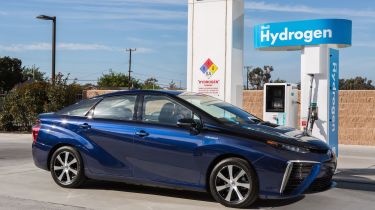Toyota Mirai (2015-2020) MPG & CO2 emissions
The only byproduct of turning hydrogen to electricity is water, so no tailpipe can ever be cleaner than the Toyota Mirai's
| Range | Power | 0-62mph | CO2 emissions |
|---|---|---|---|
| Over 300 miles | 154bhp | 9.6 secs | 0g/km |
In Toyota’s longer-term vision of a hydrogen economy, you’ll gas up your fuel-cell car using hydrogen from renewable sources. For now, you’ll have to make do with hydrogen liberated from natural gas – but as an early-adopter trying to change the world, it’s the thought that counts.
Toyota Mirai MPG
Five kilogrammes of hydrogen in your Mirai’s carbon-fibre fuel tank is enough to take you 300 miles according to the officially claimed figures – and our experience suggests that’s a realistic proposition when the car is driven cautiously. A Hyundai NEXO, with its bigger tanks, will get you 400 miles without trying too hard.
Whether you can get home again depends whether your destination is anywhere near a hydrogen pump, which, let’s face it, is unlikely. The total number of public filling points in the UK is unlikely to pass 20 for a couple of years or so, based on Toyota’s own projections.
That’s why, although Toyota will supply the Mirai to private owners, it’s currently only really attractive to corporate users with predictable usage patterns. High-profile examples include the Green Tomato private-hire car firm and the Metropolitan Police, both London-based and within easy reach of hydrogen supplies.
CO2 emissions
Every car leaves a CO2 footprint when it’s manufactured, but fuel-cell-powered cars are – in Toyota’s estimation – a much greener proposition than battery-powered electric vehicles. Like all Toyota hybrids on the road today, the Mirai does employ a battery to aid acceleration and provide energy to start the fuel cell up, but at just 1.6kWh it’s a fraction of the size of the 64kWh unit in the battery-powered Hyundai Kona Electric, for example.
When it comes to refuelling/recharging, so much depends on the source of energy. It’s possible to generate hydrogen from renewable sources, and Toyota anticipates that’s the inevitable path the global energy industry will follow. For now though, most hydrogen comes from fossil-fuel sources which is an unkind compromise forced on early adopters of fuel-cell technology.
